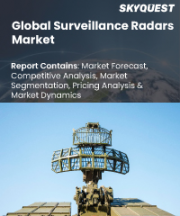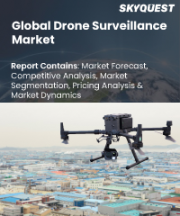
|
시장보고서
상품코드
1799199
스마트홈 비디오 감시 시장Smart Home Video Surveillance |
||||||
세계의 스마트홈 비디오 감시 시장은 2030년까지 178억 달러에 도달
2024년에 84억 달러로 추정되는 스마트홈 비디오 감시 세계 시장은 2024-2030년간 CAGR 13.3%로 성장하여 2030년에는 178억 달러에 이를 것으로 예측됩니다. 본 보고서에서 분석한 부문 중 하나인 하드웨어 컴포넌트는 CAGR 11.8%를 나타내고, 분석 기간 종료시에는 117억 달러에 이를 것으로 예측됩니다. 서비스 컴포넌트 분야의 성장률은 분석 기간중 CAGR16.5%로 추정됩니다.
미국 시장은 22억 달러, 중국은 CAGR 12.6%로 성장 예측
미국의 스마트홈 비디오 감시 시장은 2024년에 22억 달러로 추정됩니다. 세계 2위 경제대국인 중국은 2030년까지 28억 달러 규모에 이를 것으로 예측되며, 분석 기간인 2024-2030년 CAGR은 12.6%로 추정됩니다. 기타 주목해야 할 지역별 시장으로는 일본과 캐나다가 있으며, 분석 기간중 CAGR은 각각 12.0%와 11.6%를 보일 것으로 예측됩니다. 유럽에서는 독일이 CAGR 약 9.9%를 보일 전망입니다.
세계의 스마트홈 비디오 감시 시장 - 주요 동향과 촉진요인 정리
스마트 모니터링 시스템이 홈 시큐리티를 어떻게 혁신할 것인가?
스마트홈 비디오 감시는 실시간 시각적 감시, AI를 활용한 분석, 원격 액세스를 통합하여 사전 예방적 위협 감지 및 안심할 수 있는 주택 보안의 기본 계층이 되고 있습니다. 기존의 CCTV 설치와 달리 스마트 감시 시스템은 고해상도 카메라, 모션 센서, 클라우드 스토리지, 모바일 앱의 통합을 활용하여 24시간 365일 가시성과 이벤트 트리거를 통한 경고를 제공합니다. 이러한 시스템은 더 이상 단순한 수동적인 레코더가 아니라 지능적이고 상호 작용하며 더 광범위한 홈 오토메이션 생태계에 통합되고 있습니다.
스마트 초인종과 투광 조명 카메라부터 실내 팬틸트 카메라, 태양열 실외기까지, 주택 소유자는 종합적인 자가 관리형 보안 네트워크를 구성할 수 있게 되었습니다. 이 시스템에서는 스마트폰이나 스마트 디스플레이를 통해 실시간 영상 시청, 방문자와의 소통, 즉각적인 푸시 알림, 녹화 영상 확인 등이 가능합니다. 스마트 모니터링으로의 전환은 보안 요구뿐만 아니라 반려동물, 짐, 자녀의 실시간 모니터링과 같은 라이프스타일의 향상으로 이어지고 있습니다.
스마트 모니터링의 기능을 향상시키는 기술이란?
스마트 모니터링의 상황은 엣지 AI, 클라우드 컴퓨팅, 컴퓨터 비전, 안전한 무선 통신의 급속한 발전으로 뒷받침되고 있습니다. 오늘날의 시스템은 얼굴 인식, 사람/차량 감지, 수하물 인식, 이상 감지 등 과거에는 기업 수준의 솔루션에 국한되었던 기능을 갖추고 있습니다. 온디바이스 처리(엣지 AI)는 대기 시간을 줄이고, 클라우드 처리에 의존하지 않고 로컬에서 알림과 조치를 트리거할 수 있어 속도와 프라이버시를 향상시킵니다.
음성비서(Alexa, Google Assistant 등) 및 스마트 허브와의 통합을 통해 사용자는 간단한 음성 명령이나 루틴을 통해 카메라를 제어할 수 있습니다. 클라우드에 연결된 시스템은 연속 녹화, 스마트 이벤트 필터링, AI에 의한 영상 요약을 지원합니다. 이 카메라는 태양광 패널, 저전력 칩, 배터리 구동 설계를 채택하여 유연한 설치가 가능하여 에너지 효율을 높였습니다. 엔드투엔드 암호화 및 이중 인증과 같은 안전한 통신 프로토콜은 확대되는 사이버 보안 위협에 대응하기 위한 표준 기능이 되고 있습니다.
스마트 비디오 시스템은 어디에 보급되어 가장 큰 가치를 제공하는가?
짐 도난, 불법 침입, 무단 접근에 대한 우려가 높은 도시 및 교외 주택가에서 가장 많이 도입되고 있습니다. 스마트 비디오 초인종과 현관 카메라는 단독주택에서 특히 인기가 높으며, 공동주택에서는 앱 기반 테넌트 제어가 가능한 공유 출입 감시 시스템의 채택이 증가하고 있습니다.
스마트 모니터링 시스템은 별장, 임대주택, 에어비앤비(Airbnb) 스타일의 단기 임대에도 표준 장비로 자리 잡고 있으며, 부동산 소유주는 원격지에서 입주 현황을 모니터링하고 정책을 철저히 지키며 자산을 보호할 수 있습니다. 노인요양 현장에서는 약자를 은근히 감시하기 위해 이러한 시스템이 활용되고 있으며, 반려동물 보호자는 양방향 음성 및 간식 디스펜서가 장착된 카메라 시스템을 채택하고 있습니다. 알람 시스템, 모션 감지기, 스마트 잠금 장치와 통합하여 통합된 인터페이스를 통해 종합적인 홈 보안을 구성할 수 있습니다.
스마트홈 비디오 감시 시장의 성장은 몇 가지 요인에 의해 주도됩니다.
실시간 접근이 가능한 자동화된 홈 시큐리티에 대한 소비자 수요 증가로 시장이 성장하고 있습니다. AI, 4K 비디오 해상도, 엣지 프로세싱, 클라우드 기반 분석과 같은 기술 혁신이 이러한 시스템의 가치를 높이고 있습니다. 도시 지역의 범죄율 증가, 택배 증가, 셀프 모니터링 솔루션에 대한 수요가 증가하면서 보급이 가속화되고 있습니다. 보다 광범위한 스마트홈 생태계와의 호환성과 앱 기반 제어의 용이성은 신규 사용자들의 진입장벽을 낮추고 있습니다.
하드웨어의 저렴한 가격과 클라우드 스토리지의 유연한 구독 모델의 결합으로 스마트 모니터링은 대중 시장에서 쉽게 이용할 수 있게 되었습니다. 또한, 재산 보호, 노인 돌봄, 원격 주택 관리에 대한 인식이 높아지면서 보안 이외의 이용 사례도 확대되고 있습니다. 데이터 프라이버시와 사이버 보안에 대한 규제의 관심은 벤더들에게 투명성과 안전 설계를 강화하도록 촉구하고, 소비자의 신뢰와 장기적인 성장을 더욱 촉진하고 있습니다.
부문
컴포넌트(하드웨어 컴포넌트, 서비스 컴포넌트)
조사 대상 기업 예
- ADT Inc.
- Arlo Technologies, Inc.
- Avigilon Corporation
- Axis Communications AB
- Bosch Security Systems
- Brinks Home Security
- CP PLUS International
- Dahua Technology Co., Ltd.
- FLIR Systems
- Hangzhou Hikvision Digital Technology
- Hanwha Vision Co., Ltd.
- Honeywell Security Group
- Netgear(Arlo)
- Panasonic Corporation
- Ring LLC(Amazon)
- Samsung Electronics
- SimpliSafe, Inc.
- SkylinkHome
- Vivint Smart Home, Inc.
- Wyze Labs, Inc.
AI 통합
당사는 유효한 전문가 컨텐츠와 AI툴에 의해 시장 정보와 경쟁 정보를 변혁하고 있습니다.
Global Industry Analysts는 일반적인 LLM나 업계별 SLM 쿼리에 따르는 대신에, 비디오 기록, 블로그, 검색 엔진 조사, 방대한 양의 기업, 제품/서비스, 시장 데이터 등, 전 세계 전문가로부터 수집한 컨텐츠 리포지토리를 구축했습니다.
관세 영향 계수
Global Industry Analysts는 본사 소재지, 제조거점, 수출입(완제품 및 OEM)을 기준으로 기업의 경쟁력 변화를 예측했습니다. 이러한 복잡하고 다면적인 시장 역학은 수익원가(COGS) 증가, 수익성 하락, 공급망 재편 등 미시적, 거시적 시장 역학 중에서도 특히 경쟁사들에게 영향을 미칠 것으로 예측됩니다.
목차
제1장 조사 방법
제2장 주요 요약
- 시장 개요
- 주요 기업
- 시장 동향과 촉진요인
- 세계 시장 전망
제3장 시장 분석
- 미국
- 캐나다
- 일본
- 중국
- 유럽
- 프랑스
- 독일
- 이탈리아
- 영국
- 기타 유럽
- 아시아태평양
- 기타 지역
제4장 경쟁
LSH 25.09.03Global Smart Home Video Surveillance Market to Reach US$17.8 Billion by 2030
The global market for Smart Home Video Surveillance estimated at US$8.4 Billion in the year 2024, is expected to reach US$17.8 Billion by 2030, growing at a CAGR of 13.3% over the analysis period 2024-2030. Hardware Component, one of the segments analyzed in the report, is expected to record a 11.8% CAGR and reach US$11.7 Billion by the end of the analysis period. Growth in the Service Component segment is estimated at 16.5% CAGR over the analysis period.
The U.S. Market is Estimated at US$2.2 Billion While China is Forecast to Grow at 12.6% CAGR
The Smart Home Video Surveillance market in the U.S. is estimated at US$2.2 Billion in the year 2024. China, the world's second largest economy, is forecast to reach a projected market size of US$2.8 Billion by the year 2030 trailing a CAGR of 12.6% over the analysis period 2024-2030. Among the other noteworthy geographic markets are Japan and Canada, each forecast to grow at a CAGR of 12.0% and 11.6% respectively over the analysis period. Within Europe, Germany is forecast to grow at approximately 9.9% CAGR.
Global Smart Home Video Surveillance Market - Key Trends & Drivers Summarized
How Are Smart Surveillance Systems Reinventing Home Security?
Smart home video surveillance has become a foundational layer of residential security, merging real-time visual monitoring, AI-powered analytics, and remote accessibility to offer proactive threat detection and peace of mind. Unlike traditional CCTV setups, smart surveillance systems leverage high-definition cameras, motion sensors, cloud storage, and mobile app integration to provide 24/7 visibility and event-triggered alerts. These systems are no longer just passive recorders; they are intelligent, interactive, and increasingly integrated into broader home automation ecosystems.
From smart doorbells and floodlight cameras to indoor pan-tilt cameras and solar-powered outdoor units, homeowners can now configure comprehensive, self-managed security networks. These systems allow users to view live feeds, communicate with visitors, receive instant push notifications, and review recorded footage-all from their smartphones or smart displays. The shift toward smart surveillance is not only driven by security needs but also by lifestyle enhancements, such as monitoring pets, packages, or children in real-time.
What Technologies Are Elevating the Capabilities of Smart Surveillance?
The smart surveillance landscape is underpinned by rapid advancements in edge AI, cloud computing, computer vision, and secure wireless communication. Today’s systems feature facial recognition, person/vehicle detection, package recognition, and anomaly detection-capabilities once reserved for enterprise-level solutions. On-device processing (edge AI) reduces latency, allowing alerts and actions to be triggered locally without reliance on cloud processing, thus improving speed and privacy.
Integration with voice assistants (e.g., Alexa, Google Assistant) and smart hubs allows users to control cameras using simple voice commands or routines. Cloud-connected systems support continuous recording, smart event filtering, and AI-powered video summarization. Cameras are becoming more energy-efficient, incorporating solar panels, low-power chips, and battery-powered designs to support flexible installation. Secure communication protocols like end-to-end encryption and two-factor authentication have become standard features to counter growing cybersecurity threats.
Where Are Smart Video Systems Gaining Traction and Offering Maximum Value?
Adoption is highest in urban and suburban residential areas, where concerns about package theft, break-ins, and unauthorized access are more prevalent. Smart video doorbells and entryway cameras are especially popular in single-family homes, while multi-unit housing is seeing increased adoption of shared-access surveillance systems with app-based tenant controls.
Smart surveillance is also becoming a standard feature in vacation homes, rental properties, and Airbnb-style short-term rentals, allowing property owners to monitor occupancy, enforce policies, and ensure asset protection remotely. Elder care environments are leveraging these systems for unobtrusive monitoring of vulnerable individuals, while pet owners are embracing camera systems that include two-way audio and treat dispensers. Integration with alarm systems, motion detectors, and smart locks allows comprehensive home security orchestration from a unified interface.
The Growth in the Smart Home Video Surveillance Market Is Driven by Several Factors…
The market is growing due to increasing consumer demand for real-time, accessible, and automated home security. Technological innovations in AI, 4K video resolution, edge processing, and cloud-based analytics are enhancing the value of these systems. Rising urban crime rates, increased package deliveries, and demand for self-monitoring solutions are fueling adoption. Compatibility with broader smart home ecosystems and ease of app-based control are lowering barriers for new users.
Price reductions in hardware, combined with flexible subscription models for cloud storage, are making smart surveillance accessible to the mass market. Additionally, the growing awareness of property protection, elder monitoring, and remote home management is expanding use cases beyond security. Regulatory attention to data privacy and cybersecurity is prompting vendors to enhance transparency and secure design-further supporting consumer confidence and long-term growth.
SCOPE OF STUDY:
The report analyzes the Smart Home Video Surveillance market in terms of units by the following Segments, and Geographic Regions/Countries:
Segments:
Component (Hardware Component, Service Component)
Geographic Regions/Countries:
World; United States; Canada; Japan; China; Europe (France; Germany; Italy; United Kingdom; and Rest of Europe); Asia-Pacific; Rest of World.
Select Competitors (Total 42 Featured) -
- ADT Inc.
- Arlo Technologies, Inc.
- Avigilon Corporation
- Axis Communications AB
- Bosch Security Systems
- Brinks Home Security
- CP PLUS International
- Dahua Technology Co., Ltd.
- FLIR Systems
- Hangzhou Hikvision Digital Technology
- Hanwha Vision Co., Ltd.
- Honeywell Security Group
- Netgear (Arlo)
- Panasonic Corporation
- Ring LLC (Amazon)
- Samsung Electronics
- SimpliSafe, Inc.
- SkylinkHome
- Vivint Smart Home, Inc.
- Wyze Labs, Inc.
AI INTEGRATIONS
We're transforming market and competitive intelligence with validated expert content and AI tools.
Instead of following the general norm of querying LLMs and Industry-specific SLMs, we built repositories of content curated from domain experts worldwide including video transcripts, blogs, search engines research, and massive amounts of enterprise, product/service, and market data.
TARIFF IMPACT FACTOR
Our new release incorporates impact of tariffs on geographical markets as we predict a shift in competitiveness of companies based on HQ country, manufacturing base, exports and imports (finished goods and OEM). This intricate and multifaceted market reality will impact competitors by increasing the Cost of Goods Sold (COGS), reducing profitability, reconfiguring supply chains, amongst other micro and macro market dynamics.
TABLE OF CONTENTS
I. METHODOLOGY
II. EXECUTIVE SUMMARY
- 1. MARKET OVERVIEW
- Influencer Market Insights
- World Market Trajectories
- Tariff Impact on Global Supply Chain Patterns
- Smart Home Video Surveillance - Global Key Competitors Percentage Market Share in 2025 (E)
- Competitive Market Presence - Strong/Active/Niche/Trivial for Players Worldwide in 2025 (E)
- 2. FOCUS ON SELECT PLAYERS
- 3. MARKET TRENDS & DRIVERS
- Rising Home Security Awareness Propels Growth of Smart Surveillance Camera Adoption
- Demand for Remote Monitoring and Mobile Access Drives Smart Security System Deployment
- Integration of AI-Powered Motion Detection and Facial Recognition Strengthens Surveillance Capabilities
- Growth of DIY Home Security Market Spurs Demand for Easy-to-Install Smart Video Solutions
- Expansion of Subscription-Based Cloud Storage Models Generates Recurring Revenue Streams
- 5G and Wi-Fi 6 Deployment Enables High-Resolution, Low-Latency Surveillance Streaming
- Smart Doorbells and Intercoms Expand Entry Points for Residential Surveillance Integration
- Voice Control Compatibility with Smart Assistants Enhances User Convenience and Adoption
- Increased Interest in Neighborhood Watch and Shared Surveillance Drives Interconnected Camera Networks
- Rising Property Crime Rates in Suburban Areas Fuel Smart Video System Penetration
- Integration with Smart Lighting and Alarm Systems Expands Home Automation Ecosystem Value
- Real-Time Alerts and Two-Way Audio Drive Demand for Interactive Security Features
- Growing Awareness of Data Privacy Regulations Spurs Demand for Secure and Compliant Surveillance Systems
- 4. GLOBAL MARKET PERSPECTIVE
- TABLE 1: World Smart Home Video Surveillance Market Analysis of Annual Sales in US$ Million for Years 2014 through 2030
- TABLE 2: World Recent Past, Current & Future Analysis for Smart Home Video Surveillance by Geographic Region - USA, Canada, Japan, China, Europe, Asia-Pacific and Rest of World Markets - Independent Analysis of Annual Sales in US$ Million for Years 2024 through 2030 and % CAGR
- TABLE 3: World 6-Year Perspective for Smart Home Video Surveillance by Geographic Region - Percentage Breakdown of Value Sales for USA, Canada, Japan, China, Europe, Asia-Pacific and Rest of World Markets for Years 2025 & 2030
- TABLE 4: World Recent Past, Current & Future Analysis for Hardware Component by Geographic Region - USA, Canada, Japan, China, Europe, Asia-Pacific and Rest of World Markets - Independent Analysis of Annual Sales in US$ Million for Years 2024 through 2030 and % CAGR
- TABLE 5: World 6-Year Perspective for Hardware Component by Geographic Region - Percentage Breakdown of Value Sales for USA, Canada, Japan, China, Europe, Asia-Pacific and Rest of World for Years 2025 & 2030
- TABLE 6: World Recent Past, Current & Future Analysis for Service Component by Geographic Region - USA, Canada, Japan, China, Europe, Asia-Pacific and Rest of World Markets - Independent Analysis of Annual Sales in US$ Million for Years 2024 through 2030 and % CAGR
- TABLE 7: World 6-Year Perspective for Service Component by Geographic Region - Percentage Breakdown of Value Sales for USA, Canada, Japan, China, Europe, Asia-Pacific and Rest of World for Years 2025 & 2030
III. MARKET ANALYSIS
- UNITED STATES
- Smart Home Video Surveillance Market Presence - Strong/Active/Niche/Trivial - Key Competitors in the United States for 2025 (E)
- TABLE 8: USA Recent Past, Current & Future Analysis for Smart Home Video Surveillance by Component - Hardware Component and Service Component - Independent Analysis of Annual Sales in US$ Million for the Years 2024 through 2030 and % CAGR
- TABLE 9: USA 6-Year Perspective for Smart Home Video Surveillance by Component - Percentage Breakdown of Value Sales for Hardware Component and Service Component for the Years 2025 & 2030
- CANADA
- TABLE 10: Canada Recent Past, Current & Future Analysis for Smart Home Video Surveillance by Component - Hardware Component and Service Component - Independent Analysis of Annual Sales in US$ Million for the Years 2024 through 2030 and % CAGR
- TABLE 11: Canada 6-Year Perspective for Smart Home Video Surveillance by Component - Percentage Breakdown of Value Sales for Hardware Component and Service Component for the Years 2025 & 2030
- JAPAN
- Smart Home Video Surveillance Market Presence - Strong/Active/Niche/Trivial - Key Competitors in Japan for 2025 (E)
- TABLE 12: Japan Recent Past, Current & Future Analysis for Smart Home Video Surveillance by Component - Hardware Component and Service Component - Independent Analysis of Annual Sales in US$ Million for the Years 2024 through 2030 and % CAGR
- TABLE 13: Japan 6-Year Perspective for Smart Home Video Surveillance by Component - Percentage Breakdown of Value Sales for Hardware Component and Service Component for the Years 2025 & 2030
- CHINA
- Smart Home Video Surveillance Market Presence - Strong/Active/Niche/Trivial - Key Competitors in China for 2025 (E)
- TABLE 14: China Recent Past, Current & Future Analysis for Smart Home Video Surveillance by Component - Hardware Component and Service Component - Independent Analysis of Annual Sales in US$ Million for the Years 2024 through 2030 and % CAGR
- TABLE 15: China 6-Year Perspective for Smart Home Video Surveillance by Component - Percentage Breakdown of Value Sales for Hardware Component and Service Component for the Years 2025 & 2030
- EUROPE
- Smart Home Video Surveillance Market Presence - Strong/Active/Niche/Trivial - Key Competitors in Europe for 2025 (E)
- TABLE 16: Europe Recent Past, Current & Future Analysis for Smart Home Video Surveillance by Geographic Region - France, Germany, Italy, UK and Rest of Europe Markets - Independent Analysis of Annual Sales in US$ Million for Years 2024 through 2030 and % CAGR
- TABLE 17: Europe 6-Year Perspective for Smart Home Video Surveillance by Geographic Region - Percentage Breakdown of Value Sales for France, Germany, Italy, UK and Rest of Europe Markets for Years 2025 & 2030
- TABLE 18: Europe Recent Past, Current & Future Analysis for Smart Home Video Surveillance by Component - Hardware Component and Service Component - Independent Analysis of Annual Sales in US$ Million for the Years 2024 through 2030 and % CAGR
- TABLE 19: Europe 6-Year Perspective for Smart Home Video Surveillance by Component - Percentage Breakdown of Value Sales for Hardware Component and Service Component for the Years 2025 & 2030
- FRANCE
- Smart Home Video Surveillance Market Presence - Strong/Active/Niche/Trivial - Key Competitors in France for 2025 (E)
- TABLE 20: France Recent Past, Current & Future Analysis for Smart Home Video Surveillance by Component - Hardware Component and Service Component - Independent Analysis of Annual Sales in US$ Million for the Years 2024 through 2030 and % CAGR
- TABLE 21: France 6-Year Perspective for Smart Home Video Surveillance by Component - Percentage Breakdown of Value Sales for Hardware Component and Service Component for the Years 2025 & 2030
- GERMANY
- Smart Home Video Surveillance Market Presence - Strong/Active/Niche/Trivial - Key Competitors in Germany for 2025 (E)
- TABLE 22: Germany Recent Past, Current & Future Analysis for Smart Home Video Surveillance by Component - Hardware Component and Service Component - Independent Analysis of Annual Sales in US$ Million for the Years 2024 through 2030 and % CAGR
- TABLE 23: Germany 6-Year Perspective for Smart Home Video Surveillance by Component - Percentage Breakdown of Value Sales for Hardware Component and Service Component for the Years 2025 & 2030
- ITALY
- TABLE 24: Italy Recent Past, Current & Future Analysis for Smart Home Video Surveillance by Component - Hardware Component and Service Component - Independent Analysis of Annual Sales in US$ Million for the Years 2024 through 2030 and % CAGR
- TABLE 25: Italy 6-Year Perspective for Smart Home Video Surveillance by Component - Percentage Breakdown of Value Sales for Hardware Component and Service Component for the Years 2025 & 2030
- UNITED KINGDOM
- Smart Home Video Surveillance Market Presence - Strong/Active/Niche/Trivial - Key Competitors in the United Kingdom for 2025 (E)
- TABLE 26: UK Recent Past, Current & Future Analysis for Smart Home Video Surveillance by Component - Hardware Component and Service Component - Independent Analysis of Annual Sales in US$ Million for the Years 2024 through 2030 and % CAGR
- TABLE 27: UK 6-Year Perspective for Smart Home Video Surveillance by Component - Percentage Breakdown of Value Sales for Hardware Component and Service Component for the Years 2025 & 2030
- REST OF EUROPE
- TABLE 28: Rest of Europe Recent Past, Current & Future Analysis for Smart Home Video Surveillance by Component - Hardware Component and Service Component - Independent Analysis of Annual Sales in US$ Million for the Years 2024 through 2030 and % CAGR
- TABLE 29: Rest of Europe 6-Year Perspective for Smart Home Video Surveillance by Component - Percentage Breakdown of Value Sales for Hardware Component and Service Component for the Years 2025 & 2030
- ASIA-PACIFIC
- Smart Home Video Surveillance Market Presence - Strong/Active/Niche/Trivial - Key Competitors in Asia-Pacific for 2025 (E)
- TABLE 30: Asia-Pacific Recent Past, Current & Future Analysis for Smart Home Video Surveillance by Component - Hardware Component and Service Component - Independent Analysis of Annual Sales in US$ Million for the Years 2024 through 2030 and % CAGR
- TABLE 31: Asia-Pacific 6-Year Perspective for Smart Home Video Surveillance by Component - Percentage Breakdown of Value Sales for Hardware Component and Service Component for the Years 2025 & 2030
- REST OF WORLD
- TABLE 32: Rest of World Recent Past, Current & Future Analysis for Smart Home Video Surveillance by Component - Hardware Component and Service Component - Independent Analysis of Annual Sales in US$ Million for the Years 2024 through 2030 and % CAGR
- TABLE 33: Rest of World 6-Year Perspective for Smart Home Video Surveillance by Component - Percentage Breakdown of Value Sales for Hardware Component and Service Component for the Years 2025 & 2030

















